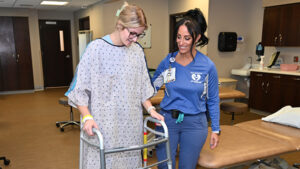Outpatient Therapy Services
The outpatient rehabilitation program is an interdisciplinary team of skilled staff that provide patient centered evaluations and consults for patients with any injury or illness effecting functional performance and quality of life.
Our team consists of:
- Physical medicine and rehabilitation physician
- Physical therapists
- Occupational therapists
- Speech language pathologists
- Rehabilitation psychologists
Our team will deliver an evidence-based plan of care. Our mission is to achieve the highest level of functional outcome while addressing your goals and providing an effective home program for continued success.
Additional Info
LOCATION
Center for Rehabilitation Services
ECMC Main Building
462 Grider Street
Buffalo, NY 14215
HOURS OF OPERATION
Monday – Friday
7:00 a.m.-5:00 p.m.
CONTACT
General Phone
716-898-3225
Our Outpatient Programs
Physical Medicine and Rehabilitation
Our physiatrists, also known as physical medicine and rehabilitation specialists, treat a wide variety of neurological, musculoskeletal, and orthopedic medical conditions through non-surgical management. They provide treatment and rehabilitative options that are customized to you and are designed to restore function and enhance overall health and wellbeing. The physiatrists work closely with your rehabilitation team to improve outcomes. Common conditions treated by physiatrists include stroke, spinal cord injury, traumatic brain injury, overuse injuries such as carpal tunnel syndrome, arthritis, back and neck pain, sports injuries, workplace injuries, and more. They also perform EMG and nerve conduction studies to help diagnose neurological conditions.
Stroke and Neuro Rehabilitation
The ECMC neuro rehab team will evaluate and treat your unique presentation of deficits and impairments with direct access to a physical medicine and rehabilitation medicine specialist as needed all in one convenient location. Additionally, patient and family support is available through our rehab psychology team.
Physical Therapy
Will assess and treat any challenges you may be experiencing, including mobility, strength, tone, endurance, balance, and coordination. You will receive education regarding your acquired physical impairments, the recommended plan of care, assistive devices available to maximize your functional independence, and a home exercise program.
Occupational Therapy
Will use goal-oriented activities to evaluate and improve the daily living skills needed for you to fully function in your home, work, and community. Our goal is to improve your participation in daily life activities such as self-care, home management, work, functional mobility, and leisure pursuits by addressing motor, cognitive, and visual perceptual deficits.
Speech Therapy
Will conduct a thorough diagnostic evaluation and develop an appropriate plan of care, incorporating patient/family education components, speech therapy exercises, and necessary follow-up services. Treatment programs may address language therapy (comprehension and expression), cognitive retraining (memory, attention and problem solving), and voice therapy (vocal quality). Additionally, we can assess and determine the presence and severity of swallowing difficulties as well as determine the need for a modified barium swallow study (MBS)
MBS – Modified Barium Swallow
A modified barium swallow study is completed by a speech language pathologist and radiologist team under x-ray to evaluate the anatomy and swallowing physiology in real time while assessing swallow function and safety for a variety of food and liquid consistencies.
Spinal Cord Rehabilitation
We provide a comprehensive, skilled outpatient program for both traumatic and non-traumatic spinal cord injury. Our multidisciplinary team of physiatrists, psychologists, physical therapists, occupational therapists, and speech therapists are ready to help you successfully reenter the community by providing comprehensive patient and family education, spasticity management, sexuality management, neurogenic bowel and bladder management, wheelchair seating evaluations, driving evaluations and training, and therapeutic programs aimed at maximizing both your physical and emotional functioning.
Orthopedic/Musculoskeletal
We offer a comprehensive approach for evaluating and treating pain and functional impairment caused by trauma, surgery, sports, burns, de-conditioning, and work -related injuries and falls. Your evaluation and each treatment will be completed by your primary physical therapist for the duration of your care. Our therapist-to-patient ratio allows for high-quality personalized care
Hand Therapy
Our occupational therapy team, led by a certified hand therapist, uses a combination of treatment methods, including splinting, therapeutic exercise, and patient education to address the functional impairments related to, but not limited to, fractures, tendon/nerve repairs, carpal tunnel syndrome, and arthritis.
Amputation Rehabilitation Program
Our rehabilitation program for amputees provides specialized, interdisciplinary services for patients with upper or lower extremity limb loss. Our program includes individualized pre-prosthetic and prosthetic evaluations and training to ensure your maximum recovery. We work actively with your prosthetist, surgeon, and your primary physician to achieve your mobility goals.
Osseointegration
A state-of-the-art approach to above knee amputations
Osseointegration is a revolutionary procedure for lower extremity, above knee amputees, utilizing a titanium rod implanted in the bone to attach the prosthetic appliance instead of a traditional socket. ECMC—with its plastic surgeons, orthopedic surgeons, rehabilitation professionals, and in coordination with your prosthetist—is one of the first US hospitals to offer this procedure. Please call 716-898-4347 for additional information or for provider referrals
OPRATM Implant System: www.integrum.se
Driver Evaluation and Adaptive Driving Program
Our driver evaluation program determines an individual’s ability to begin or resume driving, taking into consideration a person’s physical, cognitive, and visual deficits. It is the only medical-based evaluation program in WNY. Evaluations and licensed driver training are performed exclusively by specially trained occupational therapists in driver rehabilitation.
Driver Rehab Program:
(716) 898-3225
driveinfo@ecmc.edu
FAQs
What does the driver evaluation involve?
Includes a 2-part assessment, an in-clinic portion to assess foundational motor, visual, and cognitive skills, followed by a behind-the-wheel portion performed in ECMC’s adapted vehicle with examiner controls for safety. A full recommendation is provided to you at the conclusion of the evaluation.
What does a medical-based driving evaluation mean?
Many other community-based programs simply assess a person’s in-vehicle performance but do not have the education and training to assess the numerous critical performance areas that may impact driving in the presence of injury or illness. Understanding critical relationships between performance areas and their impact on driving enables us to make an objective determination and recommendation.
Will results be shared at the end of the evaluation?
Yes. Final recommendations and any education on equipment, restrictions, or alternative community transportation resources will be provided. If adaptive training is recommended, a treatment plan will be discussed.
Who should be referred to the ECMC Driver Rehabilitation Program?
Any individual whose ability to initiate, resume, or continue driving is in question due to a diagnosis, injury, or illness.
Are evaluation and training covered by medical insurances?
In cases where a person’s reason for referral meets medical necessity, this may be a covered service.
Are you affiliated in anyway with the NYS Department of Motor Vehicles?
No. However, we provide skilled driving evaluations for the DMV Medical Review Unit and interact with local DMV offices regarding adaptive equipment restrictions.
Adaptive Driving and Training
ECMC can evaluate and train licensed drivers and coordinate care and training for new drivers who are permit holders. Following the evaluation and successful training, a vehicle modification prescription is provided to the client to bring to their mobility vendor of choice for installation of equipment. Common diagnoses requiring adaptive driving equipment include: stroke, spinal cord Injury, amputations, cerebral palsy, and various nervous system disorders.
Vestibular Rehabilitation
Vestibular rehabilitation is a specialized form of therapy intended to evaluate and treat dizziness, vertigo, and disequilibrium. It alleviates both the primary symptoms (vertigo, dizziness, visual disturbance, and/or imbalance) and secondary symptoms (nausea and/or vomiting, reduced ability to focus or concentrate, and fatigue) caused by these disorders.
Modified Constraint Induced Movement Therapy
Constraint induced movement therapy (CIT or CIMT) is a form of rehabilitation therapy that improves upper extremity function in people who have suffered a stroke or other central nervous system damage by increasing the use of their affected arm. Modified CIMT programs have been administered in outpatient clinical environments and have enjoyed high success rates internationally.
Wheelchair Evaluations
We offer comprehensive seating and positioning evaluations for individuals who require the use of manual wheelchairs, power wheelchairs, or scooters. An occupational therapist will perform an evaluation to address your mobility goals and coordinate care with your mobility vendor of choice to determine appropriate mobility devices and options. Documentation submission will be completed in a thorough and timely manner for insurance approval. Upon approval, a follow-up appointment will be conducted to ensure appropriate fit and provide education and training on equipment operation.
Additional Rehab Services
Inpatient Medical Rehab Unit (MRU)
The Medical Rehabilitation Unit (MRU) at ECMC, founded in 1978, has a long history of dedication to the community, helping sick and injured people return to their families, homes, and careers.
Rehabilitation Psychology Services
Our rehabilitation program emphasizes a holistic approach to emotional health and recovery by providing effective management of injuries and illnesses.
Pediatric Education & Diagnostic Services (PEDS)
ECMC provides community-based multidisciplinary evaluations and therapeutic services to children, from birth to five years of age, through NYS Early Intervention Program or the Committee on Preschool Special Education in the child’s school district.


